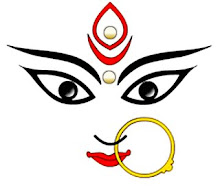 |
| Pitru Paksha also known as Mahalaya Paksha |
In 2011, Pitru paksha starts on September 13th and ends on September 27 th with Mahalaya Amavasya [Sarvapitru Amavasya].
Amavasya September 2011 date is September 27. The Amavasya Time begins at 07:29 PM on September 26 and ends at 05:13 PM on September 27.
Pitru Paksha Shraaddham begins on Ashwin Krishna Pratipada or first day of Ashwin month and goes up to the following New Moon [Amavasya] day as per North Indian calendar. Pitru Paksha is performed for the departed immediate relatives usually up to three preceding generations.
Mahalaya Paksha: Seek the Blessings of the Ancestors
Pitru Paksha is the occasion to repay debt to our departed ancestors by satisfying their souls by performing rites. For this purpose “Shraaddh” is performed with a belief that the dead ones would alive amongst us. Yama the Lord of death allows the souls to come down to the earth and receive offers from their descendants. This practice is made to the dead “Pitrus”. The last day of this period, the new moon day also called Sarvapitru Amavasya, is considered as the most important day in the year for performing obsequies and rites.
According to Hindu mythology, the souls of three preceding generations of one's ancestor reside in Pitru–loka, governed by Yama, who takes the soul of a dying man from earth to Pitru–loka. When a person of the next generation dies, the first generation shifts to heaven and unites with God, so Shraaddh offerings are not given. Thus, only the three generations in Pitru–loka are given Shraaddh rites, in which Yama plays a significant role.
When the legendary donor Karna died in the epic Mahabharata war, his soul transcended to heaven, where he was offered gold and jewels as food. Karna had done limitless charity of wealth, but had neglected to do Anna-Dana. Thus he found himself in the midst of wealth and plenty, but with no food to appease him. However, Karna needed real food to eat and asked lord Yama the reason for serving gold as food. Yama told Karna that he had donated gold all his life, but had never donated food to his ancestors in Shraaddh. Karna said that since he was unaware of his ancestors, he never donated anything in their memory. To make amends, Karna was permitted to return to earth for a fifteen day period, so that he could perform Shraaddh and donate food and water in their memory. This period is now known as Pithru Paksha.
 |
| Observing Mahalaya Amavasya |
According to Hindu mythology, every individual's who wants to perform this Pitru Tharpanam, they should do it on the same day of their ancestor died which will fall within any one of these fifteen days.
 |
| Importance of Pitru Paksha |
The elder son or grandsons of the family performs Shraaddh in honor of the dead and offers respectful homage, during this period. It is believed that only after performance of Shraaddh ritual, the soul of the deceased relative attains Moksha. In this context, the scripture Garuda Purana says, "there is no salvation for a man without a son". The scriptures preach that a householder should propitiate ancestors, along with the gods, ghosts and guests. The scripture Markandeya Purana says that if the ancestors are content with the Shraaddh, they will bestow health, wealth, knowledge and longevity, and ultimately heaven and salvation upon the performer.
Even those who died without progeny received these oblations given on this Pitru Paksha Amavasya day. All those who had failed to do deeds of charity and Anna-Dana and were thus denied these comforts in the Pitru Loka, benefited by these ceremonies. Those deceased whose date of death is not known and whose annual Sraaddha cannot be done, they also get these oblations of Pitru Paksha. Souls whose life was cut off by violent, accidental or unnatural death and to whom, therefore, offerings cannot reach in the ordinary course, to them, too, the Pitru Paksha offerings reach directly.
Things not to do
During the period of Pitru Paksha, traditionally people do not buy or wear new clothes, and don't get a hair-cut. The day they perform the ritual, male members of the family do not even shave. Women do not wash their hair on that particular day. Auspicious works like marriage, settling marriage, any kind of birth ceremony etc. are prohibited during this period.
About Pitru Shakti and Pitru Mukti
1. There are "Pitru Shakti" sacred spaces imbued with the spiritual potency of exalted Pitru Deva Beings. And then there are "Pitru Mukti" sacred spaces - places so holy that they are able to grant moksha salvation to even these exalted Pitru Devas!2. For Example, Siddha Sathguru Venkataraman pointed out that Seshambadi [near Kumbakonam] and Poovalur [near Trichy] as two of the greatest Pitru Mukti [ancestor salvation] sacred spaces in the entire world.
Lord Shri Ram and Pitru Moksha Tamil Nadu
Lord Sri Ram Himself did tarpanam pooja for His father Dasaratha and His Soorya Dynasty ancestors at more than 108 of these Pitru Moksha ancestor salvation sacred places in Tamil Nadu alone. These include Rameswaram, Nedungudi, Thilatharpanapuri, Innambur, Theerthandapuram and Kekkarai, just to mention a few.
 |
| One of the Pitru Mukti Kshetras -Varanasi |
 |
| Sacred Temple-Thirupullani - Ramar Darbha sayanam |
Pitru Moksha Sacred places - Ideal for all Ancestor Worship Procedures
In all these Pitru Moksha sacred places, the exalted Pitru Devas themselves accept your tarpana, argya and sraddha offerings at all times, but particularly during the Mahalaya Paksha fortnight. Furthermore, they themselves are engaged in serious worship at these "Ancestor Salvation" sacred spaces.Thus these pitru mukti temples and sacred places are most effective for conducting your pitru [exalted ancestor] worship and pitru karma.

























1 comment:
Excellent & Useful article
Those who perform these Karmas will be blessed !!!
If the ancestors Bless us( we are here because of them), God follows suit.
If parents curse us,(which a parent rarely does) , even God will let us down.
Please continue to provide us with more such good articles, on regular basis.
Post a Comment